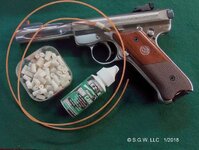Staff Member
Bronze Supporter
- Messages
- 4,217
- Reactions
- 5,052
Doesn't matter, spray until it's coated, leave for a few minutes, then agitate and wipe off. Once it wipes off clean, you're done with cleaning, just lube and done.
Follow along with the video below to see how to install our site as a web app on your home screen.
Note: This feature may not be available in some browsers.
Be aware, from poissonal experience, that cleaning the barrel of your .22cal rifle MAY screw up the accuracy for at least as much time as it takes to shoot a fifty-shot box of ammunition.
I know it seems contrary, but that's how it is. Every one of my seven .22cal rifles shoots like a hose after cleaning 'em - so I've learned my lesson and leave them alone, except for the outside, obviously.
So, nylon brushes? (colour irrelevant?)Just a little information that a friend and I talked about. It's better to use the black, or other colored, nylon bore brushes because they stay there original shape.
Woah there, that's massively dependent on the composition of the metal, as you might imagine, the metal used in a brush will be the type that reforms it's original shape.If you take a piece of bronze or copper wire and bend it that's how it stays.
I'm curious about this, i would have imagined that a copper bore brush would be harsher against any baked on carbon, no? I'm assuming you have worn out/broken some metal brushes?I have put all my metal wire bore brushes it a bag and put them far away. The nylon brushes last longer and clean better.
